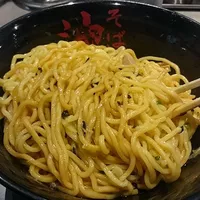おいしい 油 そば 。。。(n4)OiledRamenNoodles
|あぶら|||
|oil|||oil
Leckere geölte Soba ... (n 4) Geölte Ramen-Nudeln
Delicious oil soba ...(n 4) Oiled Ramen Noodles
Deliciosa Soba en Aceite ... (n 4) Fideos Ramen en Aceite
Délicieuses Soba huilées ... (n 4) Nouilles Ramen huilées
맛있는 기름 소바 ... (n 4) 기름 라면
Heerlijke Geoliede Soba ... (n 4) Geoliede Ramen Noodles
Pyszny olejowany makaron ... (n 4) Olejowany makaron ramen
Delicioso Soba oleado ... (n 4) Massa Ramen oleada
Вкусная масляная лапша соба ... (n 4) Лапша Рамен с маслом
美味拉面...(n 4) 油拉面
美味油渍荞麦面(n 4) 油渍拉面
漢字 で 「 油 」 と 書いて あぶら と 読みます。
かんじ|||あぶら|||かいて|
||油|||||
kanji||oil|||oil||
Das Kanji für "Öl" wird in Kanji geschrieben und bedeutet "Ölflecken".
It is written as "oil" in kanji and read as abura.
Le kanji signifiant "huile" est écrit en kanji et se lit "taches d'huile".
한자로 '油'자를 써서 아부라(油)라고 읽습니다.
它的汉字写为“油”,读作“abura”。
「 油 そば "。
|あぶら
Öl-Soba".
"Abura soba".
Soba à l'huile".
"油 そば ".
'Нефтяная соба'.
“油荞麦面”。
なんだか 太り そう な 食べ物 です ね。
|ふとり|||たべもの||
有点|发胖|||||
kind of|getting fat|||||
왠지|살찌는|||||
Dieses Essen sieht fettig aus.
It's a kind of food that makes you fat.
Ces aliments ont l'air de faire grossir.
왠지 살찔 것 같은 음식이네요.
Эта пища выглядит жирной.
这是一种让人发胖的食物。
店内 は ラーメン屋 と 同じ です。
てんない|は|ラーメンや||おなじ|
inside the store|||||
Die Einrichtung ähnelt einem Ramen-Laden.
The inside of the shop is the same as a ramen shop.
L'intérieur ressemble à un magasin de ramen.
가게 내부는 라면집과 동일합니다.
Интерьер напоминает магазин рамена.
店内装潢与拉面店相同。
カウンター が あって 、 店員 が 2人 働いて いました。
||||てんいん||ふたり|はたらいて
柜台|||店员||||
|||store clerk|||working|
Es gab einen Tresen und zwei Kellner, die dort arbeiteten.
There was a counter and two employees were working.
카운터도 있고, 점원 2명이 근무하고 있었다.
Там стояла стойка и работали два официанта.
有一个柜台,有两名员工正在工作。
この 時間 は 、 ひま そう でした。
|じかん|は|||
|||free||
|||한가해||
Um diese Tageszeit schien viel los zu sein.
This time seemed to be free.
Ce moment de la journée semble être très fréquenté.
이 시간 은 여유로운 시간이었습니다.
В это время суток, судя по всему, было многолюдно.
这次看来是自由了。
先に 食券 を 買わなければ なりません。
さきに|しょっけん||かわなければ|
先买|食券|||
before|meal ticket||must buy|
Sie müssen erst eine Essensmarke kaufen.
You have to buy a meal ticket first.
Il faut d'abord acheter un ticket repas.
먼저 식권을 사야 합니다.
Сначала нужно купить талон на питание.
我得先买张饭票。
「 並盛 ( なみもり )" は ふつう の りょう という 意味 です。
|なみもり||||は|||
并盛|普通份||普通的||量|||
regular size|normal serving||||amount|||
보통 양||||||||
Das Wort "normal" bedeutet "gewöhnliches" oder "normales" Essen.
“Namimori” means normal.
Normal mori signifie "nourriture ordinaire".
"並盛(나미모리)"는 보통의 양이라는 뜻입니다.
«Намимори» означает «нормальный».
“Namimori”意味着正常。
760円 です ね。
ななひゃくろくじゅうえん||
It's 760 yen.
760엔이네요.
760 иен.
760日元。
ん?
Huh?
А?
となり の 「 大盛 」 も 同じ 金 がく です。
|||おおもり|||おなじ|きん
邻居||大份||||金额|
||extra large|||||
||대盛|||||
Auch im benachbarten Omori erklingt die gleiche goldene Musik.
The "large serving" next to it is also the same money.
La ville voisine d'Omori possède également la même musique dorée.
바로 옆의 「대성」도 같은 금박입니다.
В соседнем Омори также звучит золотая музыка.
隔壁的“大份”也是同样的钱。
ん?
What the...?
А?
その 横 の "W 盛り 「 も 同じ 金 がく です ね。
|よこ|||さかり|||おなじ|きん||
||||盛り||||||
|side||amount|helping|||money|||
Die "W-Überraschung" daneben ist ebenfalls aus demselben Gold.
The "W Mori" next to it is also the same price.
그 옆의 'W자 모양'도 같은 금박을 입혔네요.
Рядом с ним находится "W-сюрприз", выполненный из того же золота.
旁边的“W森”也是同样的金色。
"W 盛り 「 は 大盛 より りょう が 多い ん です。
|さかり||は|おおもり||||おおい|
|||大份||量||||
serving|extra||large serving|than|extra||||
Die Portion "W" enthält mehr Gerichte als die Portion "D".
“W Mori” has more portions than “Omori”.
"W 곱빼기"는 곱빼기보다 양이 더 많습니다.
Порция "W" содержит большее количество блюд, чем порция "D".
“W Mori”比“Omori”的份量更多。
これ が 「 大盛 」 です。
|||おおもり
Dies ist die "große Portion".
This is "Omori".
이것이 바로 '대접'입니다.
Это "большая порция".
这是“大森”。
席 の 前 に 、 食べ方 が 書いて あります。
せき||まえ|||たべかた||かいて
||||way to eat|||
Die Anweisungen zum Essen sind vor Ihrem Sitzplatz angebracht.
How to eat is written in front of the seat.
좌석 앞에 먹는 방법이 적혀 있습니다.
Инструкции по приему пищи написаны перед вашим местом.
座位前面写着怎么吃。
酢 と ラー油 を よく まぜる と 美味しい み たいです。
す||ラーユ|||||おいしい||
醋||辣油|||||好吃||
vinegar||chili oil|||mix||delicious||
||chili oil|||to mix||||
Es schmeckt besser, wenn Sie den Essig und Rayu gut mischen.
It seems to be delicious if you mix vinegar and chili oil well.
식초와 고추기름을 잘 섞어 먹으면 맛있는 것 같다.
Если хорошо смешать уксус и рааю, то получается очень вкусно.
醋和辣椒油拌匀似乎很好吃。
書いて ある と おり に 酢 と ラー油 を 入れて みます。
かいて|||||す||ラーユ||いれて|
written|||written||vinegar||chili oil||putting|try
|||||vinegar|||||
Versuchen Sie, Essig und Rayu wie beschrieben hinzuzufügen.
I will add the vinegar and chili oil exactly as written.
Попробуйте добавить уксус и рааю, как описано выше.
我会按照上面的说明添加醋和辣椒油。
まぜる と 色 が 変わりました。
||いろ||かわりました
||||改变了
mixed||color||changed
Beim Mischen änderte sich die Farbe.
The color changed when mixed.
При смешивании цвет изменялся.
混合时颜色发生变化。
ラーメン のように スープ が ありません。
|like|soup||
|like|||
Es gibt keine Suppe wie Ramen.
There is no soup like ramen.
Нет такого супа, как рамен.
没有像拉面那样的汤。
油 だけ です。
あぶら||
oil||
Nur Öl.
Only oil.
Только нефть.
这只是石油。
めん が 少し 太いです。
||すこし|ふといです
面|||很粗
|||thick
|||is thick
Die Nudeln sind ein wenig dicker.
The noodles are a little thick.
Лапша получается немного толще.
面条有点粗。
味 は 、 油っこくありません。
あじ|は|
||不油腻
taste||not greasy
||is not oily
Der Geschmack ist nicht zu salzig.
The taste is not oily.
Вкус не жирный.
味道不油腻。
じつは 、 " 油 そば 「 の カロリー は 」 ラーメン 「 の より 低い そう です。
じつは||あぶら|||||は||||
||||卡路里|||||||
actually||||calories||noodles|||||
||||calories|||||||
Tatsächlich ist der Kaloriengehalt von ölhaltigen Buchweizennudeln geringer als der von Ramen-Nudeln.
Actually, it seems that the calorie content of "oil soba" is lower than that of "ramen."
Действительно, калорийность жирной гречневой лапши ниже, чем у лапши рамен.
事实上,“油荞麦面”的热量含量低于“拉面”。
ちょっと 安心 しました。
|あんしん|
|放心|
|relieved|
Ich war ein wenig erleichtert.
I'm a bit relieved.
我稍稍松了口气。
美味しいです よ!
おいしいです|
deliciousです|
It is delicious!
働いて いました|安心 しました|み たいです|書いて あります|太り そう|書いて ある

